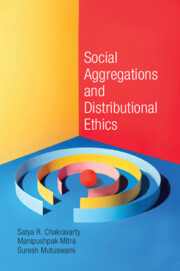Book contents
- Frontmatter
- Contents
- Preface
- 1 Introduction
- 2 Individual and Social Orderings
- 3 May’s Theorem
- 4 Arrow’s Theorem with Individual Preferences
- 5 Relaxing Arrow’s Axioms
- 6 Arrow’s Theorem with Utilities
- 7 Harsanyi’s Social Aggregation Theorem
- 8 Distributional Ethics: Single Dimensional Approaches
- 9 Distributional Ethics: Multidimensional Approaches
- 10 Social Choice Functions
- 11 Strategyproofness on Quasi-linear Domains
- Index
6 - Arrow’s Theorem with Utilities
Published online by Cambridge University Press: 11 January 2023
- Frontmatter
- Contents
- Preface
- 1 Introduction
- 2 Individual and Social Orderings
- 3 May’s Theorem
- 4 Arrow’s Theorem with Individual Preferences
- 5 Relaxing Arrow’s Axioms
- 6 Arrow’s Theorem with Utilities
- 7 Harsanyi’s Social Aggregation Theorem
- 8 Distributional Ethics: Single Dimensional Approaches
- 9 Distributional Ethics: Multidimensional Approaches
- 10 Social Choice Functions
- 11 Strategyproofness on Quasi-linear Domains
- Index
Summary
INTRODUCTION
Arrow’s theorem is based on both non-measurability (utility of an individual cannot be measured) and non-comparability (the welfare of two different individuals cannot be compared). The non-measurability is implicit in Arrow’s use of orderings to represent individual preferences and non-comparability is implied by the controversial irrelevance of individual alternatives axiom. If either of these assumptions is relaxed, then Arrow’s theorem does not hold.
Sen (1970) was the first to propose a framework for exploring the consequences of relaxing non-measurability and non-comparability. Instead of assuming the set of all preference ordering as a primitive (as in Arrow), he assumed it to be the set of all possible utility functions. A profile is a list of utility functions, one for each agent. A social welfare functional associates a utility function to each profile.
In this framework, Arrow’s theoremholds if the utility functions are only ordinally measurable and interpersonally non-comparable. Arrow’s impossibility theoremis robust in the sense that weakening the requirement that social preferences are orderings, while preserving non-measurability and non-comparability, leaves little room for sensible social binary relations. Sen (1974, 1977a, 1986a) has provided a taxonomy of different measurability and comparability assumptions. In this chapter, we study Arrow’s theoremunder these measurability and comparability assumptions.
Why should we care about measurability and comparability assumptions? d’Aspremont and Gevers (2002) argue that there is a distinction between the problem of determining the “relationship that collective decisions or preferences ought to have with individual preferences” and the separate problem where “an ordinary citizen attempts to take the standpoint of an ethical observer in order to formulate social evaluation judgements.” The first problem is appropriate when looking at the design of constitutions, for instance. When designing a constitution, we will be concerned with the abilities of voters to manipulate the voting process because voting decisions typically involve groups. We also want to make minimal assumptions on measurability and comparability because preferences cannot be measured.
However, when an ordinary citizen takes the viewpoint of an ethical observer, she can make assumptions about measurability and comparability in order to determine her own voting strategy, or to recommend a voting process for society. d’Aspremont and Gevers (2002) also observe that much of the discussion of social welfare prior to Arrow was concerned with the second problem.
- Type
- Chapter
- Information
- Social Aggregations and Distributional Ethics , pp. 77 - 100Publisher: Cambridge University PressPrint publication year: 2023



